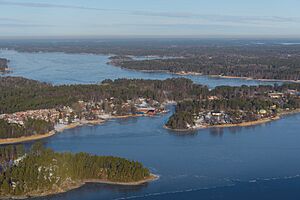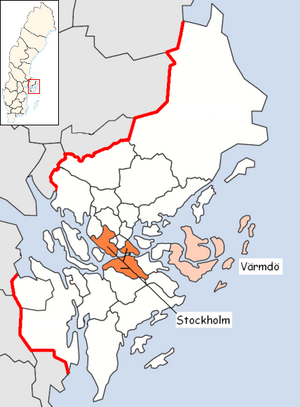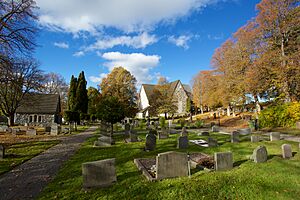Värmdö Municipality facts for kids
Quick facts for kids
Värmdö Municipality
Värmdö kommun
|
||
|---|---|---|
 |
||
|
||
 |
||
| Country | Sweden | |
| County | Stockholm County | |
| Seat | Gustavsberg | |
| Area | ||
| • Total | 2,998.89 km2 (1,157.88 sq mi) | |
| • Land | 442.96 km2 (171.03 sq mi) | |
| • Water | 2,555.93 km2 (986.85 sq mi) | |
| Area as of January 1, 2010. | ||
| Population
(June 30, 2012)
|
||
| • Total | 38,033 | |
| • Density | 12.68236/km2 (32.8472/sq mi) | |
| Time zone | UTC+1 (CET) | |
| • Summer (DST) | UTC+2 (CEST) | |
| ISO 3166 code | SE | |
| Province | Uppland and Södermanland | |
| Municipal code | 0120 | |
| Website | www.varmdo.se | |
| Density is calculated using land area only. | ||
Värmdö Municipality (Värmdö kommun) is a special area in Stockholm County, located in east-central Sweden. It's like a local government area. The main town and administrative center is Gustavsberg. In 2005, Gustavsberg had about 9,682 people living there. It is located on the main island, about 37 meters (121 feet) above sea level.
The municipality gets its name from its largest island, Värmdön. This island is quite big, covering about 180 square kilometers (69 square miles).
The Värmdö Municipality you see today was formed in 1974. This happened when the older Värmdö area joined with Gustavsberg and Djurö. Gustavsberg had actually been a separate area since 1902, but it became part of Värmdö again.
Contents
Exploring Värmdö's Geography
Värmdö Municipality is famous for its many islands. It has about 10,000 islands, all part of the beautiful Stockholm archipelago. Some of the larger and more well-known islands include Värmdö, Ingarö, Fågelbrolandet, Djurö/Vindö, Svartsö, Möja, Granholmen, Runmarö, and Nämdö.
While Gustavsberg is the main town, there are also many smaller villages and communities spread across the islands. These include places like Djurö, Stavsnäs, Mörtnäs, Hemmesta, Brunn, Strömma, and Sandhamn. Each of these places has its own unique charm.
A Look at Värmdö's History
The name Värmdö was first recorded in 1314. What it means exactly isn't fully clear. One idea is that it comes from the word värmd, which describes a small warm spring in the ocean. These springs can create holes in the ice during winter, and there are several of them in the area.
However, people have lived in this area for much longer than 1314. Evidence shows that people were here as far back as the Stone Age. Early residents survived by fishing and hunting animals like seals and sea birds. The coastal weather wasn't great for growing traditional grains. So, farmers often focused on growing potatoes instead.
Around 1850, steam boats started to become popular. Wealthy people from Stockholm began building vacation homes near the steamboat stops. In the 1930s, new main roads were built. This meant that only islands still relied on steamboats. The area continued to grow.
In the 1970s, a big change happened. Six smaller local areas merged together to create the Värmdö Municipality we know today. The new municipality adopted the coat of arms from Gustavsberg. This symbol features two porcelain ovens, representing the area's history.
Today, Värmdö is a fast-growing area near Stockholm. It's also one of the most popular places in Sweden for vacation houses. During the summer months, the number of people in Värmdö can triple because of all the visitors!
Industries in Värmdö
For a long time, the main industry in Värmdö Municipality was the porcelain factory in Gustavsberg. This factory started in the 1820s. Around the year 1900, about 1,000 people worked there. This made it one of the largest workplaces in all of Sweden.
Besides the porcelain factory, tourism is a very important part of Värmdö's economy. As mentioned, the population triples during the summer. This is because many tourists come to visit and many people own vacation houses here. This brings a lot of business to the local shops and services.
Population Changes in Värmdö
How the Population Has Grown
The number of people living in Värmdö Municipality has changed a lot over the years. You can see how it has grown from 1970 to 2019 in the chart below. The population has steadily increased, showing that more and more people are choosing to live in this area.
| Year | Population | ||||||||
|---|---|---|---|---|---|---|---|---|---|
| 1970 |
12,882
|
||||||||
| 1975 |
16,050
|
||||||||
| 1980 |
17,846
|
||||||||
| 1985 |
19,173
|
||||||||
| 1990 |
22,067
|
||||||||
| 1995 |
26,548
|
||||||||
| 2000 |
31,260
|
||||||||
| 2005 |
34,933
|
||||||||
| 2010 |
38,301
|
||||||||
| 2015 |
41,107
|
||||||||
| 2017 |
43,444
|
||||||||
| 2019 |
45,000
|
||||||||
|
Source: SCB - Folkmängd efter region och år. |
|||||||||
People from Different Backgrounds
Värmdö is home to people from many different places. On December 31, 2017, about 7,305 people living in Värmdö had a foreign background. This means they were either born outside Sweden or had both parents born outside Sweden. This made up about 16.81% of the total population of 43,444 people.
To compare, on December 31, 2002, about 4,515 people had a foreign background. This was about 13.82% of the population at that time. This shows that Värmdö has become more diverse over the years.
In 2017, about 5,683 people (13.08%) living in Värmdö were born in a country other than Sweden. Many different countries are represented among the residents of Värmdö.
Getting Around Värmdö: Transport
Värmdö is unique because it's often easier to reach by water than by land! The Waxholmsbolaget boat service offers many routes to the different islands in the Värmdö archipelago. This is a popular way to travel between the islands.
By land, the main road is county road 222. This is a motorway that connects Värmdö to Stockholm. The road ends at the ferry harbor in Stavsnäs. Stavsnäs is a very important connection point for people traveling to and from the Stockholm archipelago by boat.
Värmdö Municipality does not have any train connections. However, it has a good bus system. Many bus routes are operated by Storstockholms Lokaltrafik, also known as SL. Most of these buses travel to and from Slussen in Stockholm. In 2018, the bus terminal in Stockholm was moved to a new, larger temporary location to handle more buses and passengers.
Some of the main bus lines that serve Värmdö include route 422 from Nacka, and routes 425, 433, 434, and 474 from Stockholm. Bus services have gotten much better since 2005, with more routes added.
Sports in Värmdö
Värmdö Municipality has a few sports clubs where you can play and watch different games:
- Värmdö IF
- Värmdö Hockey
Famous People from Värmdö
Some well-known people have connections to Värmdö:
- Peter Jöback
- Henrik von Rehbinder
- Felix Sandman
See also
In Spanish: Municipio de Värmdö para niños
 | Misty Copeland |
 | Raven Wilkinson |
 | Debra Austin |
 | Aesha Ash |



